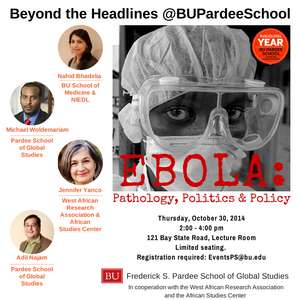BtH: Pardee School Panel Discusses Ebola
 Experts on infectious disease, African politics, and African society gathered at the Frederick S. Pardee School of Global Studies at Boston University for the latest panel discussion in the new series of seminars called “Beyond the Headlines @BUPardeeSchool” (BtH) to discuss “Ebola: Pathology, Politics and Policy.”
Experts on infectious disease, African politics, and African society gathered at the Frederick S. Pardee School of Global Studies at Boston University for the latest panel discussion in the new series of seminars called “Beyond the Headlines @BUPardeeSchool” (BtH) to discuss “Ebola: Pathology, Politics and Policy.”
The purpose of the new series of events is to cultivate informed conversations amongst experts and practitioners on issues that are currently in the news headlines, but to do so with a focus on intellectual analysis and on longer-range trends. Held on Thursday, October 30, 2014, the panel brought together four seasoned experts to discuss the global response and implications of the Ebola scare. The event was hosted by the Pardee School in cooperation with the West African Research Association (WARA) and the African Studies Center (ASC).
The panel was introduced and moderated by Prof. Adil Najam, Dean of the Pardee School of Global Studies. Panelists included Prof. Nahid Bhadelia (BU Medican School and Director of Infection Control at the National Emerging Infectious Diseases Laboratory, NEIDL), Prof. Michael Woldemariam (Pardee School of Global Studies and African Studies Center) and Dr. Jennifer Yanco (West African Research Association and Africa Studies Center).
Dr. Jennifer Yanco talked about the importance of understanding the Ebola crisis as a truly ‘global’ crisis, but also stressed on the importance of not allowing this to stereotype and miscontstrue our understanding of West Africa, and more generally of Africa. She pointed out that this is not just a health crisis but a development crisis. Any real solution must therefore address the conditions of maldevelopment and injustice that allow such crises to thrive.
Prof. Nahi Bhadelia, who has been working on Ebola in the countries hardest hit by the crisis and spoke as she herself prepares to leave for Liberia, pointed out that how the issue is framed in the broader conversations will have a direct bearing on how it is managed. She suggested that misinformation is one of the biggest challenges in dealing with the crisis and, therefore, better informaion dissemination has to be one of the most important strategies to deploy in response.
Prof. Michael Woldemariam was of the view that very little attention has been paid to the African political response to the Ebola issue. He pointed out that this response was initially haphazard but has recently seen much better coordination, including from the African Union. He argues that ability of Africa to develop a common political voice and strategy in response to this challenge will have a bearing not only on Ebola but also on future emerging crises on the continent.
All the panelists felt that the crisis could have been handled much better at the beginning but also expressed the hope that better practices are now being adopted and it will be contained. However, the real challenge will be whether important lessons are learnt and implemented from this experience. Conversation amongst the panelists was followed by a discussion with the audience of students and faculty.